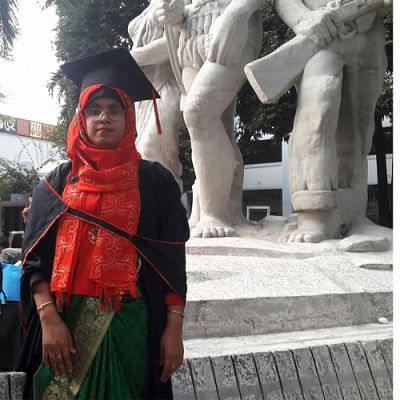How long will women be punished for their ambitions?

"In life, your parents come first, after the Great and most Benevolent Allah. They are the greatest blessing and safest shelter. Because of the mercy of Allah and the sacrifices of my parents, because of their prayers, advice, courage, discipline, love, affection, encouragement—for standing next to me like mountains through all my troubles—I have been able to earn my Bachelor's degree from the Oxford of the East, Dhaka University."
This is a rough translation of a post from Sumaya Khatun's Facebook, dated December 7, 2019, along with pictures from the 52nd convocation of Dhaka University (DU). Sumaya spoke of how her father had been the driving force behind her education, and how much she wished he had seen her graduate (he passed away three months earlier). She wrote of how hard it was to lose her little sister, only 12 years old, in 2013, and still carry on—"my Suraiya", she called her. At the time of her Facebook post, she was studying for a Masters' degree in Islamic Studies at DU, which she later passed with distinction. Sumaya had wanted to go on to study for the BCS exams. She was a 26-year-old from Jessore who, in a way, embodied our ideal of the middle-class Bangladeshi woman—pious, educated, hardworking, devoted to her family. Not the sort of girl you would expect to have trouble for being too "ambitious", or for not "knowing her place".
On June 21, Sumaya's mother received a phone call from her father-in-law from Natore (she had married in 2019 and moved there), saying she was ill. When she reached Natore Sadar Hospital the next day, she found her daughter's lifeless body in a morgue. The resident medical officer said they found bruises and signs of strangulation. Sumaya's mother then filed a murder case against Sumaya's husband, father-in-law, mother-in-law and sister-in-law, telling reporters that their motive for killing her was her professional aspirations. Even six months ago, Sumaya had been locked up, beaten, threatened with murder and told to give up her studies and concentrate on running the household instead. Despite all odds, she had persevered. And she paid for that perseverance with her life.
After the story of Sumaya's death broke, a family member who is a faculty at DU mentioned how it reminded her of one of her students—Mafruda Huq Sutopa, who confided in her friends how she had to study in the bathroom to hide from her husband. On September 19, 2009, Sutopa was found dead at her husband's residence; her family alleged that she had been tortured and killed. More than ten years later, the case has reportedly still not been resolved. Sumaya and Sutopa are just two of maybe hundreds of thousands of Bangladeshi women who have had their dreams turned to dust by patriarchy, and as expected in a patriarchal society as relentless as ours, social media commentators have already gone out of their way to make it the woman's fault.
"In a Muslim country, women should obey their husbands," said one. Another quipped, "why did she get married if she wanted to defy her husband?" Some of the comments are downright aggressive: "Who does she think she is? Running after money and forgetting her husband… she deserved to die," and on and on. This story (and the following reaction) has been repeated so often that it would seem tiring if it didn't involve the extinguishing of an innocent life every time—no matter how pious, traditional or ordinary you are, as soon as you reach too high or speak too loud, as soon as you "dare", you have violated some unspoken "moral" code that continues to permeate our society and stifle the voices of our women. Nusrat Jahan Rafi's case comes to mind—another Bangladeshi girl who paid with her life for refusing to stay silent and do as she was told.
How does a nation deal with gender-based violence that is so relentless, with patriarchy that is so deep-rooted? The first and most urgent step is justice and legal redress as a deterrence. Bangladesh has come a long way in creating laws that aim to protect the rights of women. The Domestic Violence (Prevention and Protection) Act, 2010 is considered by most legal experts to be watertight and comprehensive, but as with most of our laws, implementation is the biggest challenge. This applies to the Women and Children Repression Act as well, which has abysmally low conviction rates. How can laws be applied if trials take years, if victims cannot afford proper legal counsel, if cases don't even make it to court because law enforcers are not willing to diligently pursue them? As human rights lawyer Salma Ali pointed out in a column in The Daily Star, "We need to create a circle of protection around the woman (or girl), starting from counselling, legal aid, speedy trial, and alternative livelihoods in the future—something that unfortunately does not yet exist in full form for the women of Bangladesh." Without justice for the victims of gender-based violence, these crimes will continue with impunity.
However, there is another crucial (and possibly, even more difficult) step that must be taken—changing social mindsets so that a woman can get out of a violent situation before the worst happens. A common question that is now being asked about Sumaya is—"why didn't she go back to her family after the first incident?" But realistically, how easy is it in our society for a fatherless young girl to leave her husband? Can any ordinary family deal with the trial by societythat women in this country are subject to?
The social pandemic of gender-based violence needs to be handled as carefully as the current Covid-19 pandemic, but for this, political will and the involvement of multiple social actors are required. The Ministry of Women and Children Affairs needs to play a more involved role in protecting the rights of Bangladeshi women. So far, it has not even managed to create a national database on violence against women, let alone create coordinated programmes to fight it. Educational institutions across the country also have a duty to ensure that anti-women notions are debated within classrooms, and make conscious efforts to encourage and instil progressive thought. After the Holey Artisan terrorist attack, we saw the state-run Islamic Foundation step up its anti-militancy messaging. Given that so many people in Bangladesh use a misinterpretation of religion as an excuse for gender-based violence, can Islamic Foundation not be involved in combatting these patriarchal notions? Can NGOs not move away from solely focusing on economic emancipation or keeping a "gender angle" in project documents to woo donors, and deal with gender issues from a human rights point of view?
The status of women in Bangladesh has changed a lot over the last few decades, especially due to the women's movement and integration into the economy. Our young girls know now that a life of unpaid/undervalued labour and dependence is not their only option, they too have value (even if it is only economic value). But we cannot tell them to reach for the stars, only to cut off their fingers when they try. We must demand justice for Sumaya, not just for her sake or her family's, but for every young girl who dreams big, yet fears the consequences of her ambitions.
Shuprova Tasneem is a member of the editorial team at The Daily Star.

 For all latest news, follow The Daily Star's Google News channel.
For all latest news, follow The Daily Star's Google News channel. 



Comments